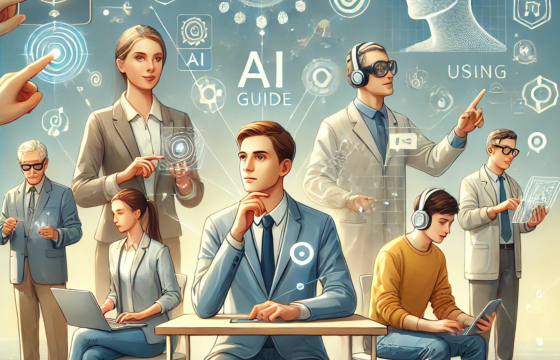Generative AI Guidance for Staff
A Generative AI Primer
Brian Basgen
Understanding the current state of technology requires understanding its origins. This reading list provides sources relevant to the form of generative AI that led to natural language processing (NLP) models such as ChatGPT.
How to Use AI to Do Stuff: An Opinionated Guide
Ethan Mollick
Explore our practical guide, "How to Use AI to Do Stuff," offering straightforward advice on choosing and utilizing AI tools effectively. Tailored for everyone from beginners to experts, this resource emphasizes ethical practices and smart tool selection to enhance your everyday tasks with AI.
Automating creativity
Ethan Mollick
“Automating Creativity” unveils how AI transcends traditional boundaries to foster innovation. This concise guide explores how AI consistently generates creative ideas, outperforming standard human benchmarks in real-world applications. It provides actionable insights on harnessing AI for enhanced idea generation, highlighting its practical superiority and transformative potential in boosting human creativity.
Understanding Generative AI at ORU
Generative AI refers to artificial intelligence technologies that can create content, such as text, images, and music, that is similar to what a human might produce. It works by analyzing vast amounts of existing material to learn patterns and styles, and then it uses this knowledge to generate new, original pieces. For example, if given a topic, a generative AI can write an essay, compose a song, or even create a graphic design. These tools are designed to assist and enhance human creativity and productivity, not to replace the human touch.
At Oral Roberts University, the integration of Generative AI into our academic and administrative framework aligns with our commitment to providing cutting-edge, holistic education that prepares students for the future. Utilizing AI tools in education can help tailor learning experiences to individual needs, enhance research capabilities, and streamline administrative processes. Furthermore, in keeping with our Christian values, we emphasize the ethical use of technology—ensuring that these powerful tools are used to glorify God, foster community, and promote integrity and honesty in all academic endeavors.
Within various departments at ORU, Generative AI is used to enhance both teaching and research. In the Theology Department, AI assists in analyzing religious texts to find patterns and insights that enrich classroom discussions. In the Sciences, researchers use AI for data analysis, helping to predict experimental outcomes and model complex biological processes. Additionally, our Communications Department utilizes AI to help students learn how to craft compelling digital content, preparing them for careers in media and journalism. Each of these examples demonstrates how AI can serve as a tool to broaden understanding and improve efficiency, all while upholding the values that define ORU.
Choosing a Generative AI Tool for Work at ORU
Data Sensitivity: When using GenAI tools, be cognizant of the data privacy implications. It’s important to ensure that no sensitive personal information, such as social security numbers, addresses, or financial details, are input into these tools. Always assume that data shared with GenAI platforms could potentially be accessed by external parties.
Transparent Pricing: Be cautious of GenAI tools that offer “free-to-start” options but require credit card information upfront. Investigate the full cost of any subscriptions and understand the terms for cancellation before committing.
Effective Prompts: Develop your ability to interact with GenAI tools effectively. Learn from curated lists of prompts that have been proven to optimize the functionality of these systems.
It’s vital to recognize that despite their advanced abilities, GenAI tools are not sentient and operate based on patterns learned from vast data sets. Familiarize yourself with their limitations to set realistic expectations about what these tools can achieve.
Guidelines on the Ethical Use of Generative AI
- Non-Sentient Nature of GenAI: It’s important to recognize that despite their sophisticated outputs, GenAI models, such as large language models (LLMs), do not possess consciousness or self-awareness. They generate responses based on patterns in data they were trained on, which may not reflect current realities or nuanced understandings.
- Cultural Limitations: Currently, most GenAI models are optimized for Standard American English, which might marginalize other dialects or cultural expressions. This limitation should be considered when using GenAI tools in communication or content creation to ensure diverse and inclusive representation.




